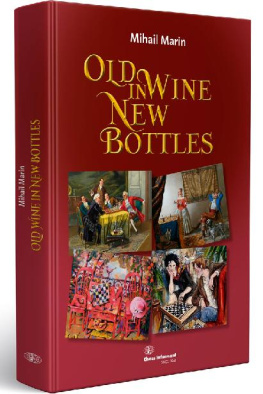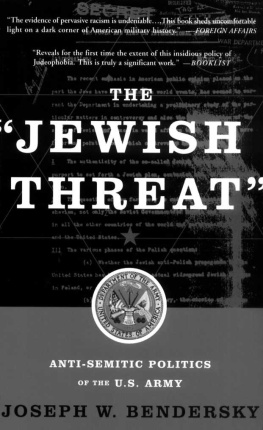Mihail Sebastian
For Two Thousand Years
Mihail Sebastian is one of the most important Romanian writers of the twentieth century. Born Iosif Hechter to a Jewish family in 1907, he grew up in Brila, Romania, an ancient port on the Danube. He studied law in Bucharest from 1927 to 1929 and in Paris from 1930 to 1931, then worked occasionally as a lawyer while publishing articles, novels and plays, and being part of an influential literary circle that included the historian of religion Mircea Eliade, the playwright Eugene Ionesco and the philosopher Emil Cioran (who was the model for tefan D. Prlea in For Two Thousand Years).
During his lifetime, his most famous book was the novel For Two Thousand Years. Published in 1934, it sparked a furious debate in the newspapers for its ambiguous political stance. Critics on the left accused Sebastian of being anti-Semitic although he was Jewish, while those on the right attacked him for being a Zionist. At the core of the novel is the year 1923, when a new constitution gave citizenship to ethnic and religious minorities. The first edition of the novel included a foreword by Sebastians mentor, the philosopher Nae Ionescu, who made a series of anti-Semitic remarks and was in fact the model for the character of Ghi Blidaru. Critics wondered why Sebastian had decided to include Ionescus words and whether he agreed with him or not. Sebastian replied in an essay titled How I Became a Hooligan (1935), where he explained why he felt the need to think as lucidly as possible at a time when everything was politically charged.
His other books, written after this incident, include less political novels influenced by French modernists, such as The Town with Acacias (1935) and The Accident (1940), and plays like Holiday Game (1938) and A Nameless Star (1944). As the fascist Iron Guard rose to power, Sebastian was prohibited from work as a journalist and was abandoned by his circle of friends an experience chronicled in the diary he kept from 1935 to 1944 and which is similar in style and tone to For Two Thousand Years. Having survived the war and the Holocaust, he was killed by a truck as he crossed the street in May 1945, as he was going to teach his first university lecture on Balzac. He was 38.
When his Journal was finally published in Romania in 1996, it became a bestseller, generating a heated controversy over responsibility for war crimes and the countrys history of anti-Semitism. The English translation has been hailed as a humane masterpiece and compared to Anne Franks diary.
Philip Ceallaigh is the author of two collections of short stories, Notes from a Turkish Whorehouse and The Pleasant Light of Day, both published by Penguin. His work has been translated into ten languages and adapted for cinema and he has received the Rooney Prize for Irish Literature. He lives in Bucharest, Romania.
Jose non seulement parler de moy, mais parler seulement de moy: je fourvoye quand jecris aultre chose, et me disrobe a mon sujet. Je ne maime pas si indiscretement et ne suis si attach et mesle a moy, que je ne me puisse distinguer et considerer a quartier, comme un voysin, comme un arbre.
Montaigne, De lart de conferer
I not only dare to talk about myself but to talk of nothing but myself. I am wandering off the point when I write of anything else, cheating my subject of me. I do not love myself with such lack of discretion, nor am I so bound and involved in myself, that I am unable to see myself apart and to consider myself separately as I would a neighbour or a tree.
I believe Ive only ever been afraid of signs and symbols, never of people or things. My childhood was poisoned by the third poplar in the yard of the Church of St Peter, a tall, mysterious tree, its shadow on summer nights falling through the window, over my bed that black band slashing across my bedcovers a terrifying presence I could not understand and did not try to.
And yet, I walked bareheaded through the deserted streets of the city when it was occupied by Germans: a white trail in the sky marking the passage of planes, bombs falling all about, even close by, the short dry thumps echoing across the open country.
And yet, with cold, childlike curiosity I calmly observed cartloads of frozen Turks passing by the gates in December, and not even before those pyramids of bodies stacked like logs in a woodpile did the presence of death make me tremble.
And yet, I crossed the Danube in a damaged boat, taking in water, to Lipovan villages, just rolling up my sleeves when it seemed the rotten bottom could no longer hold out. And God knows what a bad swimmer I am.
No, I dont think Ive ever been fearful, even though the Greeks from the big garden, who pelted us with stones when they caught us there, shouted Cowardly Jew! at me daily from the moment they knew me. I grew up with that shout, spat at me from behind.
I know, though, what horror is. Horror, yes. Little nothings which nobody else noticed loomed before me menacingly and froze me with terror. Vainly would I approach the poplar across the road in the light of day, caressing its black bark and, with bloodied nails, breaking splinters from the wood exposed between the cracks. Its just a poplar, I told myself, leaning back against it, to feel it right against me so as not to forget. But by evening I had indeed forgotten, alone in my bedroom, bedded down as always at ten oclock. You could still hear the steps of passers-by from the street, muffled voices, occasional shouts. Then that familiar silence, arriving with the usual pace, in the usual stages. If I made an effort, I could perhaps recall those three or four internal beats with which my night began, real steps which I descended physically in darkness and silence. Then the shadow of the poplar found me once again tensed, with fists clenched and eyes wide open, wanting to shout out but not knowing how or to whom.
*
Made a curious discovery yesterday at the second-hand bookshop. George Gissing. La ranon dEve. From around 1900, I think. Absolutely nothing about the author (probably English). Passed a good four hours.
When Id finished it, I went into the street for an evening paper. More fighting, at the faculty of medicine in particular, and in our own faculty. I didnt attend today. Why bother?
*
Marcel Winder stopped me in the street to tell me theyd beaten him up again.
Thats number eight, he told me, not specifying whether it was his eighth fight or his eighth injury. He had a black bruise under his left eye. He was chatty, almost cheerful. Superior at any rate. Ive certainly never aspired to that kind of thing. Ive steered clear. It looks like the lads are getting ready for 10 December, but Winder didnt want to tell me too much about it.
Not your sort of thing, pal. Youve better things to worry about. And coincidentally, just coincidentally, they stop you getting into trouble with us. Just a coincidence.
Winder is wasting his time. Hes flogging a dead horse: I dont have that kind of vanity.
*
In a letter from Mama I received today:
And, in particular, dont go to the university. Ive read in the paper that big fights have broken out again, and the milliners son, when he was home, told me its worst of all at your faculty. Leave the showing off to the others. Listen to your mother and stay home.
Leave the showing off to the others. If Mama could know how that sounds.
*
Can that be it? This morning I went to the class on Roman law. No one said a word to me. I took notes feverishly, in order not to have to lift my eyes from my desk. Halfway through the lecture, a ball of paper falls on the bench, beside me. I dont look at it, dont open it. Someone shouts my name loudly from behind. I dont turn my head. My neighbour to the left watches me carefully, without a word. I cant endure his gaze and I look up.

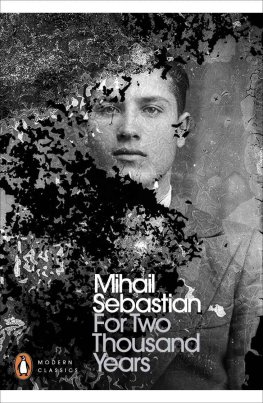
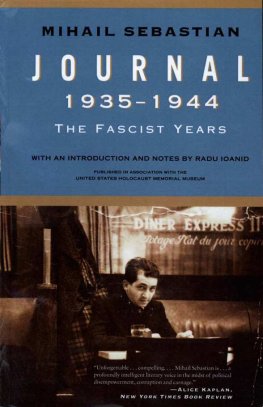
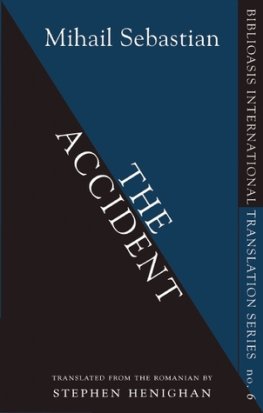

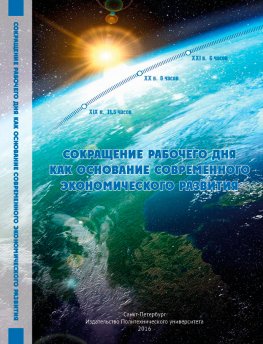
![Mihail Lermontov - A Hero of Our Time [New Translation]](/uploads/posts/book/837578/thumbs/mihail-lermontov-a-hero-of-our-time-new.jpg)

